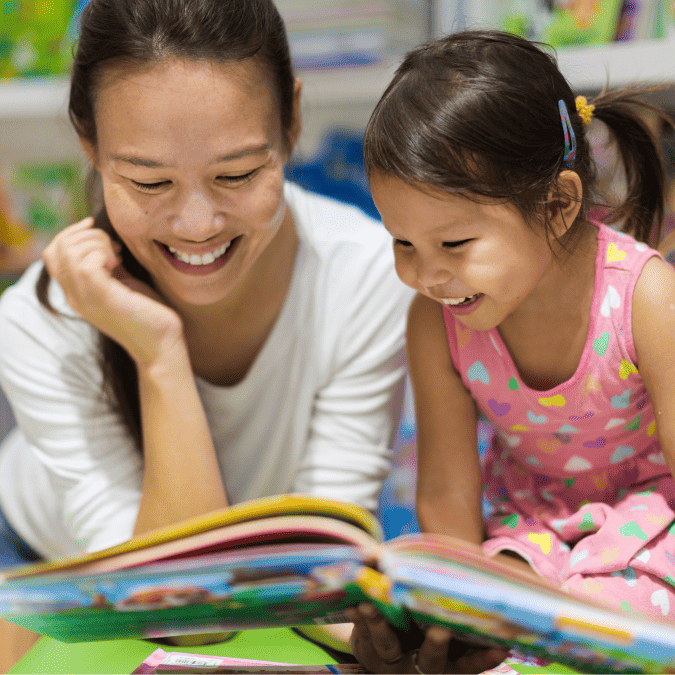Homeschooling Toddlers (and homeschooling WITH toddlers)
We may earn money from the products/companies mentioned in this post. As an Amazon Associate I earn from qualifying purchases. For more information, read our Terms & Disclosures.
Toddlers are natural learners, constantly exploring and discovering the world around them through play.
While they may not be ready for traditional academics and any form of curriculum, they are ripe for experiential learning that lays the foundation for future education (this is usually facilitated best through play).
While of course 2 and 3 year olds will always be learning, if they have older siblings who you homeschool, they may be eager to “do school” just like their brothers and sisters. They want to feel included and that can be both wonderful for them…and overwhelming and a little frustrating for their older siblings (and homeschool teacher).
Homeschooling with toddlers can be a hugely rewarding journey, and it will enable them to gain independence, develop curiosity, and a love for learning.
So let’s jump into the wild, sometimes chaotic, and always rewarding world of homeschooling toddlers: what they can learn, some of the common mistakes to avoid, and developmental milestones to keep your eyes open for.
I’ll also be sharing how you can homeschool older children with your toddlers. As a homeschool mom of 8, I can tell you’ve I’d done it many time and and it will actually make homeschooling those toddler later on much easier.

Should I homeschool my toddler?
The first question you might be asking is whether you should even homeschool your toddler?
After all, what can they possibly get out of it? Most of us realize kids should be exploring their world and playing when they’re that young. No one wants to sit them down and lose their wonder because of academics being introduced too early.
However, homeschooling mamas understand that learning is just how life is done. And that means we “homeschool” our kids all the time!
Turns out it is very possible to begin the learning journey for your child as early as age 2. Learning opportunities are everywhere, and while there is no need for strict structure or curriculums, there are some really fun printables and tools you can use for your child who is begging to “do school.”
Here’s what you want to consider before you look for them, though…
Understanding Toddler Development
Toddlers are in a crucial stage of development characterized by rapid growth and exploration.
At this age, they are developing gross and fine motor skills, language acquisition, social-emotional skills, and cognitive abilities.
They learn best through hands-on experiences and sensory play, rather than formal instruction. The more they engage their senses, the more they are learning and retaining.
What Toddlers Are Learning
Toddlers need opportunities for exploration, sensory experiences, and social interactions. They are learning not just about how the world impacts them but also how they can interact with the world.
They are introduced to big feelings (toddler tantrums happen for a reason and are a part of development) and the idea that others also have emotion.
They benefit from activities that promote language development, spatial awareness, problem-solving skills, and creativity.
Simple activities like stacking blocks, sorting shapes, exploring textures, and pretending play are ideal for this age group. This can be done with a things you have in your home already. Think household objects, odd socks, pots, and pans etc. This is what we like to call Purposeful Play.
Toddler’s Amazing Capabilities
Toddlers are capable of absorbing vast amounts of information through their everyday experiences. They can understand simple instructions, imitate actions, and engage in role play.
While they may not have the attention span for structured lessons, they thrive in environments that encourage exploration and discovery.
Most toddlers love make believe and imaginative play, cause and effect, and any activities that give them input (such as swinging or playing ring around the rosie_
What Toddlers are Not Capable of
Toddlers have limited attention spans and may struggle with tasks that require prolonged focus or abstract thinking, which is why formal education that involved sitting down and focusing is probably not best for them right now.
They may also have difficulty with impulse control and following complex instructions. It’s essential to tailor activities to their developmental level and be realistic with your expectations.
But once you embrace all the amazing things they can do and work with them to capitalize on their natural wonder, these limited capabilities won’t be an issue.

Avoide These Mistakes With Toddlers
While you may be getting excited at the prospect of homeschooling your toddler (and YAY, you should be!), let’s also take a moment to think about how to do this well.
It’s important not to snuff out the light of curiosity that is so natural to them at this early age. After all, if you’re after raising lifelong learners, you have years and years ahead of you and there’s no need to rush.
Here are some common mistakes you’ll want to avoid when you’re thinking about homeschooling as a toddler mama:
- Overloading with Academics: Avoid overwhelming toddlers with formal academics. Focus on playful learning experiences that align with their developmental stage. Your toddler can sort colors with socks while you are doing the laundry, play with pots and pans in the kitchen, there is no need for expensive toys or tools with an academic focus.
- Neglecting Playtime: Play is the primary mode of learning for toddlers. Allow ample time for unstructured play and exploration. This can be done in so many ways, even when you are homeschooling older children.
- Ignoring Daily Routines: Establishing a daily rhythm provides structure and predictability for toddlers. Consistent routines help them feel secure and support their learning and development. Plus we all love a bit of routine, don’t we?

What Do I Do with My Toddler All Day?
If you LOVE the idea of homeschooling your toddler then there are some simple things you can incorporate into your day that will help you along the way.
Simple and Hands-On Activities
Keep homeschooling activities simple and hands-on. Provide opportunities for sensory exploration, imaginative play, and creative expression. Activities like painting with watercolors, playing with playdough, and exploring nature are perfect for toddlers.
Stick to a Daily Routine
Create a daily schedule that includes a balance of active play, quiet time, and learning activities. Having a predictable routine helps toddlers feel secure and facilitates smooth transitions between activities.
Equip Them for Enjoyment
Provide toddlers with age-appropriate materials and activities that spark their curiosity and imagination. Consider using this Early Learning Activity Binder filled with interactive activities tailored to their interests and abilities.
You DO NOT need any expensive tools or learning toys when it comes to encouraging enjoyment through learning. keep it simple.

What Should My 2-Year-Old Learn?
As your little one turns 2, there will be a couple of things that you may want to help with when it comes to starting a learning journey. These include:
- Basic vocabulary and language skills (sentences of 3-5 words and expressing themselves with a mixture of vocabulary and body language)
- Fine motor skills like stacking blocks and scribbling and gross motor skills like jumping
- Social skills such as sharing and taking turns
- Spatial awareness through exploring shapes and sizes
- Curiosity – asking questions about what they see and cause and effect
What Should My 3-Year-Old Learn?
As your child turns 3 there will be other areas that you can expand on them to help them with their learning journey. These include:
- Expanded vocabulary and sentence formation (sentences should double inside from two to three years of age and vocabulary become exponentially larger)
- Developing gross motor skills like running and hopping
- Problem-solving skills through simple puzzles and sorting activities
- Pretend play and imagination development
- Deeper curiosity leading to lots of “why” questions as they seek to understand the world around them
Tips for Staying Sane While Homeschooling with Toddlers
It is not an easy ride when it comes to homeschooling toddlers; you need to be prepared for unpredictability and the whirlwind they bring with them (in the best possible way!).
No two days will be exactly the same, although routines and rhythms will help both you and your toddler thrive. Be aware that your toddler may love one doing one sort of activity one day, and show no interest in it the next.
Here are a few tips to help you stay sane while homeschooling toddlers:
Relax and Enjoy the Journey
Remember that homeschooling toddlers is about fostering a love for learning and exploration. Embrace the messiness and unpredictability of toddlerhood.
Have Fun Activities On Hand
Keep a stash of engaging activities and materials that toddlers can use to “do school” alongside older siblings. This will help your toddler to feel included and allows toddlers to participate in their own way.
Play and Engage
Take breaks from formal lessons to play and engage with your toddler. Follow their lead, join in their play, and cherish these precious moments together.
Find a Space For Mess
Make space for your toddler to enjoy sensory bins or other sensory rich activities, explore with materials like water, and generally get a bit messy. You can take it outside, do it in the bathtub, or wherever works for you.

Tips for when you need to focus your attentions on older siblings when homeschooling
Of course, if you’ve got multiple children, there will be times that you need to focus your attention on older children when homeschooling and your toddlers may feel more like a distraction or challenge.
Of course, some activities (like a field trip to the zoo) can be enjoyed all together, but if you’re trying to teach mathematics or other more complicated concepts a toddler may feel more frustrating. That’s okay; you’re a solution finder and you’ve got this. Here are some ideas that may help:
Create a Flexible Schedule
Establish a flexible daily schedule that accommodates the needs of both older children and your toddler. Include blocks of time for structured learning activities, independent work, toddler playtime, and breaks.
Don’t be afraid of nap/quiet times, either. They make wonderful 1:1 opportunities for you and your older children.
Combine Learning Activities
Look for opportunities to integrate learning activities that engage both older children and your little ones or activities that your toddler can “share” in. For example, involve your toddler in hands-on science experiments, art projects, or outdoor exploration alongside their older siblings.
They don’t always need to do the same thing, but if your older child is doing an arts project, consider setting your little one up with some art supplies that are age appropriate, too.
Utilize Independent Activities
Prepare independent activities and materials that older children can engage with while you tend to your younger child.
This could include educational games, worksheets, reading assignments, or online learning platforms that they can work on independently.
Encourage Sibling Interaction
A great way to gain responsibility and teamwork among siblings is by encouraging older children to help entertain and engage with the toddler during designated playtimes.
This not only gives you a break but also strengthens sibling bonds. Our older kids love teaching their siblings new things, and it reenforces that knowledge as they are answer questions from curious little minds. It also build compassion, teaches multi-age socialization, and helps build friendship between siblings.
Rotate Focus
Alternate between focused learning time with older children and dedicated one-on-one time with your toddler. During toddler-focused activities, older children can work on quieter, independent tasks or engage in activities that require less supervision.
We used to love having busy boxes that our toddlers could ONLY use during certain times of the day, guaranteeing they would be excited to use them.
Utilize Nap Time
Take advantage of your little ones nap time (if they still have one) to dedicate focused learning time with older children. Use this time for more intensive lessons, discussions, or hands-on projects that may be challenging to manage with a toddler present.
Incorporate Toddler-Friendly Materials
Set up some tasks with toddler-friendly materials that can help keep your little ones entertained while you may be spending more focused time with older siblings.

Stay Organized
Keep homeschooling materials, supplies, and resources organized and easily accessible to minimize disruptions and maximize efficiency during homeschooling sessions.
Be Flexible and Patient
Understand that interruptions and distractions are inevitable when homeschooling with a toddler in tow. Be flexible with your expectations and patient with both yourself and your children as you navigate this dynamic homeschooling environment.
Take Advantage of Group Activities
Seek out homeschooling meet-ups, playgroups, or online communities where older children can participate in group activities and classes, allowing you some focused time with your little ones.
You Can Homeschool With Toddlers!
Whether you choose to start homeschooling your toddler, or are looking for ways to balance older and younger children, the journey will always be a unique and rewarding experience that embraces the natural curiosity and wonder of early childhood.
By providing hands-on experiences, nurturing their development, and fostering a love for learning, even when just balanced different age groups, parents can lay a solid foundation for their child’s educational journey. Remember to keep it simple.




